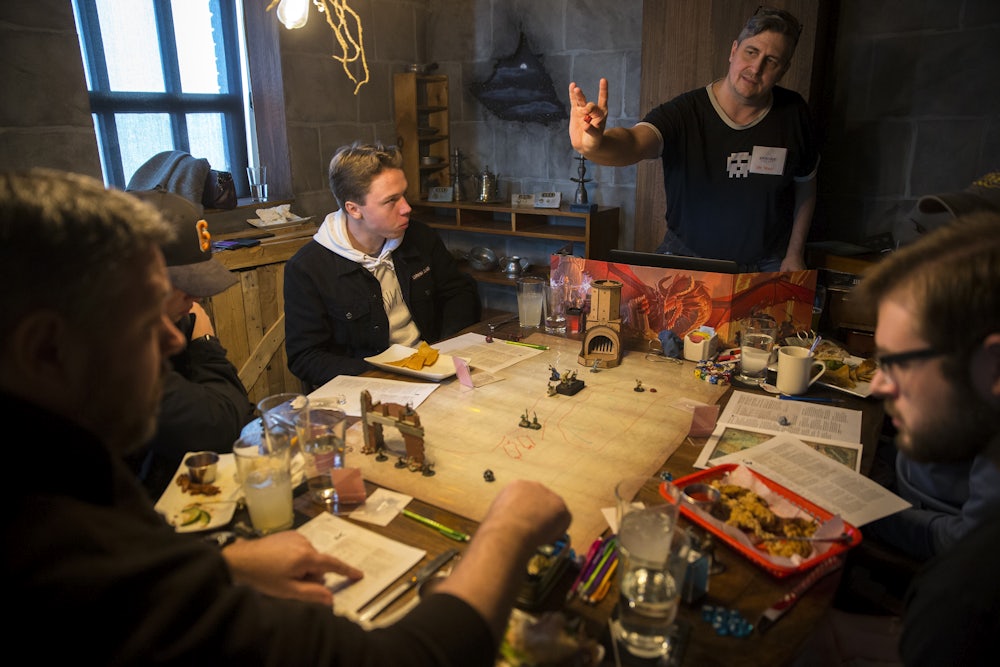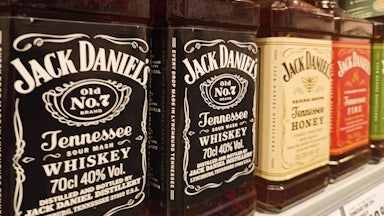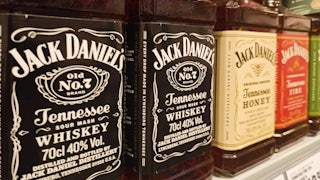Dungeons & Dragons is having a moment of sorts. While the iconic fantasy-themed role-playing game has always had a devoted fan base, recent years have seen it successfully break out into the cultural mainstream. Millions of Americans are buying its rule books. Stranger Things, the popular Netflix series, drew heavily upon its lore and aesthetic. Celebrities mention playing it while being interviewed on talk shows. A major film adaptation is set to be released later this year.
This newfound cultural prominence could soon be imperiled. At its core, D&D is a set of rules. Hasbro, whose subsidiary, Wizards of the Coast, publishes D&D’s core rule books, is now reportedly poised to rewrite one of the pieces of major arcana. And the company seems to be succumbing to some of the more depressing forces in the cultural economy, based on its apparent decision to soon abandon its user-friendly, power-to-the-players open license—all of which underscores how intellectual property law and shareholder interests shape major American cultural properties.
D&D’s first iteration came about in 1974. Many of the core features from that era remain in place today. You’re likely familiar with the basics: Players choose a class for their character to unlock certain abilities. Warriors are good in combat, for example, while wizards can cast spells. Players go through adventures designed either in official releases or crafted by whichever player serves as the dungeon master. At the end of the adventure, their characters get stronger by acquiring new equipment or unlocking new abilities.
In 2000, Wizards of the Coast released what is officially labeled as the third edition of its rule set. This became known as “the d20 system,” with “d20” being the shorthand name for the 20-sided dice that players use during a game session. That edition also came with something known as the Open Gaming License, or OGL. As its name suggests, the OGL allows independent publishers to use a basic level of D&D’s content and rules for their own products without paying any royalties to Wizards of the Coast.
Those publishers could not republish much of D&D’s intellectual property, like specific characters or fictional settings or adventure plots, under the OGL. But those companies could publish new material that uses the underlying game mechanics of the d20 system without paying Wizards of the Coast for the right to use it. Those publishers gained the freedom to create role-playing games of their own without having to develop an entirely new rule set for it, making it easier for new users to learn and reducing the risk of expensive copyright battles if one system hewed too closely to another.
By definition, the OGL didn’t bring in any direct revenue for Wizards. But the company benefited immeasurably by cementing the d20 system as the lingua franca of sorts for the RPG industry. While alternative RPG systems from independent publishers do exist and have their own loyal fan bases, none of them can currently match the d20 system for breadth and popularity. That, in turn, helped ensure that D&D’s dominance in the industry wouldn’t be easily eclipsed.
Wizards of the Coast has made small changes to the OGL over the years without revoking it. The company has also updated the d20 system a few more times since 2000, with the current generation of D&D rule books known as the fifth edition. Wizards announced last year that it would roll out another overhaul for the d20 system later this year, which it tentatively referred to as “One D&D,” and said it would update the OGL accordingly.
Last week, Gizmodo’s Linda Codego obtained a copy of “version 1.1” of the OGL and reported that the changes were far more onerous and dramatic than Wizards had suggested. According to its reading of the new version, the OGL 1.1 requires independent publishers to report their financial data to Wizards and gives the company the right to siphon off a portion of their revenue past a certain level. They noted that while the original OGL only totaled around 900 words, the new iteration runs closer to 9,000.
Perhaps the greatest change comes with the original OGL, which still applies to previous generations of D&D products and countless third-party products. That version promised a “perpetual, worldwide, non-exclusive license” to the d20 system and some of its source material. Under the new OGL, however, the original OCL license is “no longer an authorized license agreement” and “no longer in force.” That could place dozens of independent publishers in legal jeopardy if they continue to rely on previous versions of the d20 system to sell new products. How that change affects their existing products isn’t immediately clear.
Those who stick with the existing system have to play by Wizards’ rules. Crowdfunded campaigns for new rule books and adventure guides by third-party creators, for example, must give between 20 and 25 percent of their revenue to Wizards. Independent publishers must give a similar slice of any revenue over $750,000 to Wizards directly. Creators large and small who sell new materials under the OGL must label specifically which portions of them fall under the OGL and which are their own intellectual property, as if to make things easier for Hasbro’s in-house counsel to figure out who to sue.
Perversely, while it is still officially described as an “Open Gaming License,” the net effect is quite the opposite. Independent publishers who release books and materials under the new OGL must give Wizards a “nonexclusive, perpetual, irrevocable, worldwide, sub-licensable, royalty-free license to use that content for any purpose.” That would theoretically allow Wizards to print and sell any third-party material developed under the new OGL without sharing any of that revenue with the original creator. The addition of “irrevocable” is particularly pointed in the context of what it is changing: A legal status quo that had allowed an entire industry to flourish may soon be gone forever.
News of the new OGL’s terms sparked a considerable backlash in the D&D community. A group of d20 system game developers signed an open letter warning that, if implemented, the new license would “fracture” the RPG industry and described Wizards as “the dragon on top of the hoard, willing to burn the thriving village if only to get a few more gold pieces.” Ryan Dancey, a former Wizards vice president who oversaw the original OGL’s creation, told an industry journalist that Hasbro did not have the legal power to deauthorize it. That interpretation foreshadows the legal perils that companies could face once the new OGL is released.
Why the dramatic changes? Wizards has stayed largely quiet about the leak since last week but promised to address it at some point in the near future in a tweet on Tuesday. In other recent statements, however, the company has expressed a frustration of sorts that it wasn’t getting a big enough slice of the RPG industry that flourished under the OGL. The version of OGL 1.1 obtained by Gizmodo reportedly stated that while the original OGL “always intended to allow the community to help grow D&D and expand it creatively,” it also “wasn’t intended to subsidize major competitors, especially now that PDF is by far the most common form of distribution.” A reference later in the document reportedly singles out D&D apps, videos, and other unprinted materials for scrutiny.
But an even blunter explanation for the OGL changes can be found in public statements from executives at Wizards and its parent company, Hasbro, to Hasbro’s shareholders. “D&D has never been more popular, and we have really great fans and engagement,” Wizards of the Coast president Cynthia Williams told investors in December, “but the brand is really under-monetized.” Rather than viewing the constellation of creators, developers, and publishers that use the d20 system as a means to guarantee long-term market dominance, Wizards appears to be viewing them as a way to meet short-term revenue forecasts.
Hasbro’s popular image as the top toy and board-game company in the country is well deserved. It commands an arsenal of intellectual properties that were inescapable to anyone who grew up in the United States in the last 50 years, including Transformers, G.I. Joe, My Little Pony, and Power Rangers. After acquiring Milton Bradley and Parker Brothers in the 1990s, Hasbro also makes almost every board game you’ve ever heard of, from Monopoly and Scrabble to Clue and Yahtzee.
But most of these products aren’t exactly growth areas from a business perspective. People probably aren’t going to stop buying Scrabble altogether anytime soon, of course, but it’s also not likely that the market for Scrabble will grow by leaps and bounds in the future. Hasbro’s real moneymaker and growth opportunity these days is Wizards of the Coast, which it acquired in 1999. According to financial data from last year, Wizards brings in less than one-fifth of Hasbro’s net revenue but almost half of its operating profit.
In addition to D&D, Wizards also produces Hasbro’s other major cash cow—the collectible card game Magic: The Gathering. Hasbro announced last year that Magic had become its first billion-dollar brand, driven largely by a mobile gaming platform, licensing agreements with major media properties, and a deluge of new product releases. While Magic used to release around a dozen new sets and associated products each year as recently as 2015, Wizards released nearly 40 of them in 2023 alone.
These changes haven’t come without pushback from the Magic community, some of whom have complained of wallet fatigue at being asked to keep up with new cards and sets. Nor have they escaped the notice of Wall Street. Last November, Bank of America downgraded Hasbro’s stock from a “buy” to an “underperform,” after its analysis concluded that the company was printing too many Magic cards, diluting the brand’s value and driving players to other collectible card games. “Hasbro is killing its golden goose,” the bank argued.
Perhaps the most infamous example of perceived greed came late last year when Wizards was celebrating Magic’s thirtieth anniversary. The company announced a special release of cards from the first Magic set in 1993, including cards that it had promised in the 1990s never to reprint again. Players could spend $1,000—yes, you read that correctly—for four randomized packs of cards from that set. Similar packs for new sets can cost as little as $5. And to keep the promise it made in the 1990s, Wizards said the cards from the anniversary set could not be used in tournaments, which dramatically reduces their potential resale value on the secondary market for players and collectors alike. Similar price tags are unlikely in D&D, but the underlying spirit may remain the same.
With Hasbro’s declaration last year that it hopes to grow its profits by 50 percent over the following three years, D&D appears to be the company’s next target for a revenue squeeze. Shredding a two-decade-old license that propped up large portions of the RPG industry may have been the most obvious way to grow shareholder value. But it may prove counterproductive if publishers, developers, and customers opt for gaming systems that are less onerous than the d20 system may soon become. That, in turn, could allow for alternative systems to siphon away players and disposable incomes—a scenario that the original OGL’s broad terms implicitly hoped to avoid.
There is a tragic irony in all of this. D&D players occasionally refer to a player archetype known as the “rules lawyer.” This person gets so obsessed with the tedium of D&D’s many rule books and instruction manuals—to achieve victory in a battle, perhaps, or merely to prove a point—that they ignore the game’s fundamental spirit of collaborative storytelling. Almost every player group has encountered a rules lawyer to some degree during their adventures. Few of them may have expected that the worst rules lawyer of all would be Dungeons & Dragons itself.










